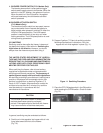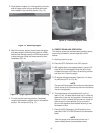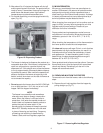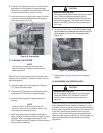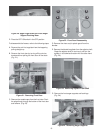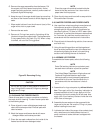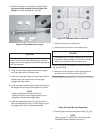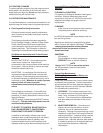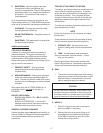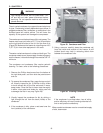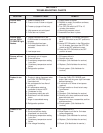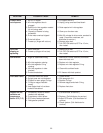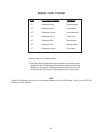
17
3. SANITIZING – After the machine has been
cleaned and contains no milkstone, the
machine is reassembled. Then a FDA approved
sanitizing solution is run through the machine to
kill bacteria. The machine is then ready for
food preparation.
As a recommended cleaner and sanitizer for your
frozen dessert machine, STERA-SHEEN has proven
to be one of the best daily maintenance products for:
· CLEANING – Thorough removal of all solids
including butterfat and milk fat.
· MILKSTONE REMOVAL – Complete removal of
milkstone.
· SANITIZING – FDA-approved no rinse sanitizer
for food contact surfaces.
Additional Information
THE USE OF DELIMERS
A delimer is a strong acid that has the ability to
dissolve milkstone. This type of chemical may
become necessary once high levels of milkstone
have developed. While these products are very
effective for removing HIGH levels of milkstone, they
are not ideal for two reasons:
1. PRODUCT SAFETY – Strong acids are
dangerous chemicals and handling them
requires safety
2. MACHINE DAMAGE – Strong acids will attack
metal and rubber causing premature wear of
parts. The use of a delimer needs to be closely
monitored to avoid damage to machine surfaces
and parts.
With proper daily use of STERA-SHEEN or it’s
equivalent, there is no need for the use of a
DELIMER.
DO NOT USE BLEACH
· BLEACH HAS ABSOLUTELY NO CLEANING
PROPERTIES.
· BLEACH IS CORROSIVE. It can and will
damage components of the machine causing
premature wear and metal corrosion.
GENERAL PURPOSE CLEANERS
General purpose cleaners do not have the ability to
remove milkstone. Milkstone will become a problem
if not remedied with additional products and
procedures.
THE USE OF CHLORINE TEST STRIPS
“Test strips” are used to determine concentrations of
active chlorine in sanitizing solutions. To use the
strips, tear off a small portion and submerge it into
the sanitizing solution. Then, compare the color
change to the color key on the side of the test strip
dispenser to determine the approximate chlorine
concentration.
The ideal concentration of chlorine needs to be 100
ppm (as stated by the FDA).
NOTE
Follow the directions on the container for proper
concentration.
There are two main factors that contribute to falling
chlorine concentrations in a sanitizing solution.
1. PRODUCT USE – As the chlorine in the
solution is being used, chlorine concentrations
fall.
2. TIME – As time passes, small amounts of
chlorine “evaporate” from the solution. (That is
why you can smell it.)
Sanitizing solutions should not be allowed to fall
below 100 ppm chlorine. New solutions should be
mixed once old solutions become ineffective
B. DAILY
1. The exterior should be kept clean at all times to
preserve the lustre of the stainless steel. A mild
alkaline cleaner is recommended. Use a soft
cloth or sponge to apply the cleaner.
CAUTION
Do not use acidic cleansers, stron caustic com-
pounds or abrasive materials to clean any part of
the freezer exterior or plastic parts. Use of these
types of cleaners will cause equipment damage.
C. WEEKLY
1. Check O-rings and rear seal for excessive
wear and replace if necessary.
2. Remove the drip tray by gently lifting up to
disengage from the support and pulling out.
Clean behind the drip tray and front of the
freezer with a soap solution.



